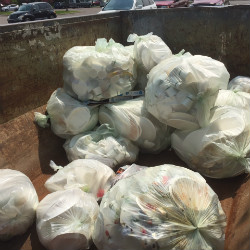“Why on earth are we using styrofoam plates?!” exclaimed the total stranger standing next to me in the line for lunch just one year ago at the Minneapolis Area Synod Assembly. That gut-level moment of tension when you pick up a styrofoam cup or throw away that plastic packaging is something to listen to. Just a passing moment and fleeting comment, but one that points to how the trappings of our throw-away culture are deeply related to the life of faith and a commitment to justice.
Minneapolis burns 1,000 tons of garbage per day at the HERC trash incinerator, 80% of which could be recycled or composted. With large amounts of pollutants and toxins from this burner landing most heavily on communities of color in North Minneapolis, it is hard to separate decisions about waste from the stark reality of environmental racism in the Twin Cities. In the wise words of Nancy Cosper, taken from Knowing Home, “Garbage is not something you throw away. There is no such place as away. Disposal is a myth.”
What happens to things like plates and forks that we use when we gather as people of faith and the greater church is integrally related how we live three of the most important calls we share: to tend and keep God’s good earth, to care for our neighbors, and to work for justice.
One year later, there was no styrofoam to be found at the spring assembly of the Minneapolis Area Synod. Instead, refreshments were held in compostable plates and cups, carried to big green organics recycling stations accompanied by colorful signs and friendly smiles of EcoFaith volunteers to help everyone navigate the process. Volunteers at the organics stations and EcoFaith table spoke of the meaningful conversations that they shared over the weekend. “As a person who staffed the lunch composting bin, I watched people take a second to make an intentional decision about what they were doing [with their waste],” said Mike Rusert, mission developer with Intertwine NE. “The leaders brought a certain curiosity as to what this could mean for them and their communities.”



At the end of the event, the numbers were reversed. About 80% of our waste was diverted from the garbage burner, with five small bags of trash, two bags of plastic recycling, and more than 20 large bags of compost. With all that raw material going back into the soil and community (instead of being burned into pollution), we were able to live into our mission to “work together so that all experience gracious invitation into life-giving Christian community and live in just and healthy neighborhoods” – caring for one another and for the flourishing of all creation.
Emilie Bouvier is the Congregational Organizer for Environmental Justice for the Minneapolis Area Synod and a member of Calvary Lutheran Church in South Minneapolis. If you would like more information about how your congregation can strive for zero waste, contact her at e.bouvier@mpls-synod.org.

